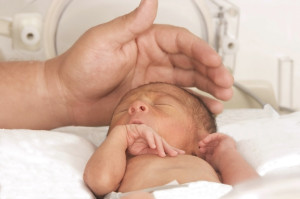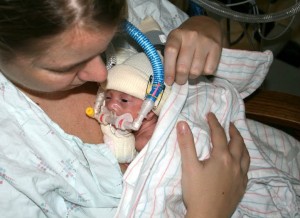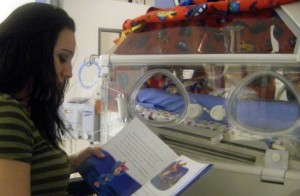
©iStockphoto.com/JuanHerrera
by Dawn K. Gibson, LCSW
When you initially became pregnant, birthing your baby and having him or her whisked away to the Neonatal Intensive Care Unit (NICU) by hospital staff was most likely not in your plan.
Many parents know that bonding after childbirth is important for both parents and baby, and you may have had some ideas about what this meant to you. You might have visualized yourself holding your baby right after the birth, looking into his or her eyes lovingly, or just lying skin-to-skin for a time. No matter what your vision, the reality of birthing a medically fragile infant is typically very different from these images. You may not have been able to hold, let alone touch, your baby right away and you may now be worried that you have lost a major opportunity to bond with your baby. Please know that this is not true. There are many other ways to bond with your baby – even during his or her NICU stay.
Bonding is a Process
Bonding will look different for each individual family due to each baby’s unique circumstances. Certain factors – such as mom’s health, the baby’s medical issues, diagnoses and gestation at birth – will affect the ways in which families can bond. For example, a baby born at 25 weeks cannot be held right away due to its size and medical instability, but a baby born at 34 weeks may be held, depending on his or her medical issues. Even so, some babies are able to tolerate touch very well, while others cannot tolerate touch at all during the initial phase of life. If you were unable to hold your baby within the first 24 hours or the first several weeks of life, please rest assured that your opportunity to bond with your baby was not completely lost. Bonding truly is a process.
Baby’s Nervous System and Caregiver’s Emotional Well-Being
Before exploring ways to bond with your fragile infant, it’s important to understand your infant’s nervous system and the active role you play in its development. All babies are born with immature and underdeveloped nervous systems and depend on parents and caregivers to regulate their emotions for the first couple of years of life. This emotional regulation is a learned behavior that babies are physiologically incapable of doing for themselves. The main form of communication between caregivers and babies is unconscious, through the infant’s and caregiver’s bodies.
Babies sense emotions from you, through your body; therefore, you send messages to your infant through facial expressions, tone of voice, touch, and tension and relaxation in your body. Because of this, it is important that you feel calm and relaxed when visiting your baby so he or she will be calm under the stressful circumstances of the NICU.
Developing a self-care regimen will help you to balance and regulate your nervous system. Take the time to listen to your body and rest when you are feeling exhausted. Take a deep breath and check-in with your body and emotions periodically during your visit with your baby. Ask yourself: “How am I feeling right now, in this moment?” (tense, tired, sad, stressed, relaxed, tightness in shoulders, aching back). Don’t judge yourself or your feelings, just notice what is happening in that moment in time and feel it shift. When you are aware of what is happening within your mind and body, it is much easier to be in tune with your baby and his or her needs. Bonding with your baby starts with you!
Bonding with Touch
♥ Before using touch as a tool to bond with your baby, please speak to your bedside nurse or your neonatologist about appropriate ways to touch YOUR baby. Every infant’s medical situation is different, and the type of touch that is appropriate for some infants, may not be for others.
Touch is a very powerful way of bonding with your baby if your baby is stable and strong enough to tolerate it. The following are ways to bond with your baby through touch:
- Skin to Skin Contact/Kangaroo Care. Both moms and dads can bond with baby in this way. Some benefits to baby are: helps regulate breathing, keeps baby warm, regulates muscular activity, and regulates stress level if caregiver is calm. Additionally, it helps increase milk production for mom if she is breastfeeding. If mom is not breastfeeding, she can still bottle feed baby while holding him or her skin-to-skin.

Photo credit: Garrett Family
- Breastfeeding. Releases oxytocin (“love” hormone), which evokes calmness in mom and baby, boosts the immune system, and regulates the heart rate and blood pressure.
- Touch a Finger. Touch a finger, hand, toe, or any body part you are able to touch if you are unable to hold your baby in the above ways. This still lets your baby know you are there and brings you closer to one another.
- Talk to Your Bedside Nurse. Your nurse can show you types of touch that are appropriate for your baby. He or she can also show you how to create boundaries around your baby and help your baby feel more comfortable.
- Pay Attention. When visiting the NICU, pay close attention to what your infant enjoys and dislikes. Adapt your touch and interactions based on baby’s preferences.
- Infant Massage. Take a class through a certified infant massage instructor and utilize techniques with your MEDICALLY STABLE baby. Benefits include reduced levels of cortisol (stress hormone), increased muscle tone, and supported parent-infant interactions, among others. Speak with your baby’s doctor and bedside nurse before using this technique with your medically fragile infant.
Other Bonding Methods

Photo credit: Overy Family
Bonding through touch is not possible for all infants and families. Some infants are too fragile to hold, or even touch. The following are ways to bond with your baby, whether touch is possible or not:
- Visit Often. Spend as much time bedside as you can. When you choose to rest (please take care of yourself!), ask a family member or friend to be with your baby, if possible.
- Be Present. Be with your baby in the present moment. Notice how he or she is feeling, what movements he or she is making, and just be there with love.
- Make Eye Contact. If your infant is comfortable with this, stare lovingly into his or her eyes.
- Hold Hands Near Baby. If your baby can tolerate it, holding your hands above your baby’s body or around his or her head – without touching – can also be a powerful technique. Your presence can be felt, and you will feel more connected to baby as well.
- Leave Your Scent. Check with NICU staff to learn what cloth items are appropriate to place in baby’s space. Sleep with that item or wear it all day tucked under your clothing, then place in your baby’s space.
- Use Your Voice. Sing, speak in soft tones, whisper, hum, talk, and read to your baby.
- Play Music. Once your baby is older than 40 weeks gestation you can use meditative music that has been written specifically for calming the nervous system. The NICU is stressful for babies and some families, so playing this music on a regular basis will relax you and your baby, creating more opportunities to bond.
- Bring Home to the Hospital. Bring pieces of your family’s life to place in your infant’s isolette or crib in the form of family photos, a special blanket, artwork from siblings, and more.
Bonding with your medically fragile infant can seem challenging at first, when all you see is the medical equipment separating you from him or her. But by utilizing the bonding methods discussed above, you will overcome the barriers between you and your amazing baby and will begin the wonderful journey of connecting with him or her. Remember that bonding is a process, and once you and your baby leave the NICU, you will find new ways to strengthen your relationship with your baby.
Dawn K. Gibson is a Licensed Clinical Social Worker in Austin, Texas, who specializes in mother/daughter counseling. For more information on Dawn and her services, please visit dawnkgibson.com.
